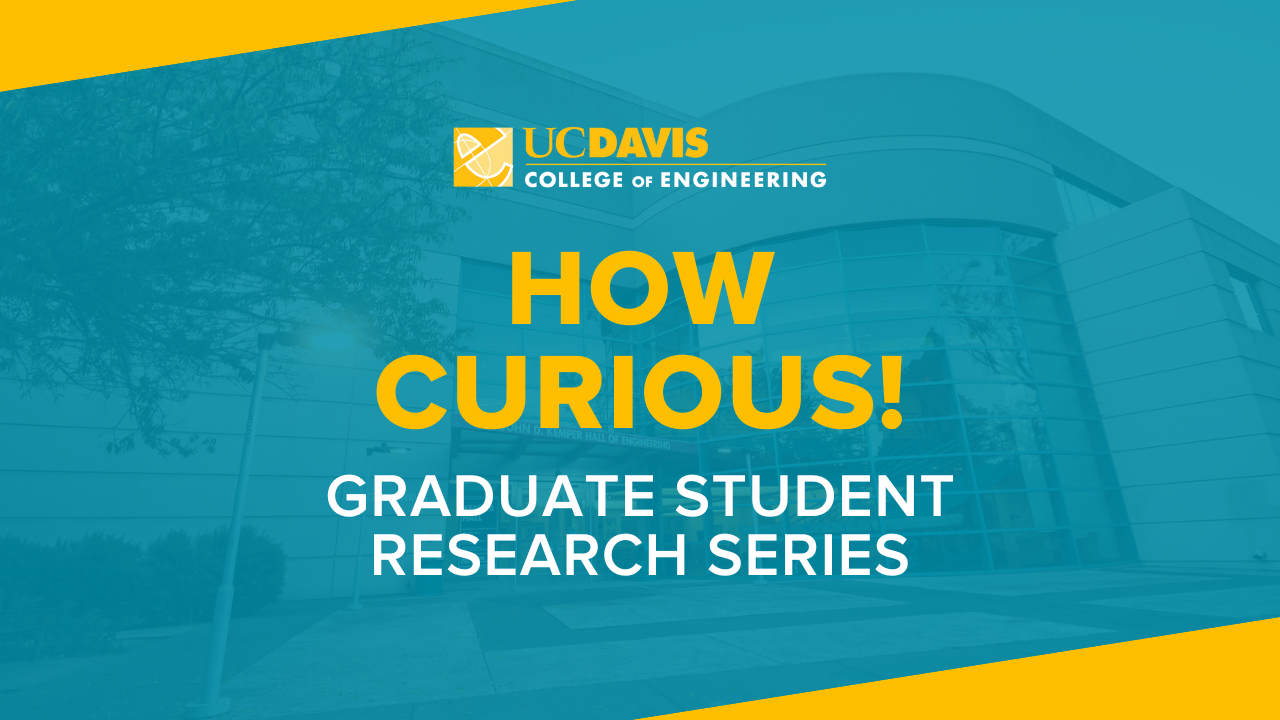
Event Date
How Curious! offers graduate students in master's and Ph.D. programs in the College of Engineering an opportunity to present their research findings and engage in scholarly discussions with their peers and faculty members. The goal is to foster collaboration, encourage intellectual exchange and support the professional development of our graduate student community.
Presenters
Weijing Wang, Transportation Technology and Policy
Presenting: Car or No Car? Toward Equity-Centered Clean Transportation
Car access is practically a necessity to get around in rural areas of the United States. Yet approximately 4.3 million people in rural areas do not have a car. Despite rural–nonrural differences in the built environment and how people travel, research on rural mobility disparities by car access is limited. This project addresses this gap by asking and answering the following questions: (1) What are the scope and scale of rural car access in the U.S. and what are the factors associated with not having a car? (2) How do rural carless residents get around relative to their nonrural peers? (3) What are the consequences of not having car access in rural areas? The results show new evidence on rural-nonrural differences in socioeconomic and mobility characteristics by car access. Rural carless households earn 64% less and 40% less than their counterparts with full car access and their nonrural counterparts, respectively. Rural Native Americans have a 2.1 times the odds of being carless than their rural white peers. Despite not owning a car, a significantly smaller proportion of rural carless residents bike, walk, or take transit than their nonrural peers (38.9% vs. 74.6%), which may indicate infeasibility of sustainable modes in some rural areas. Findings highlight rural mobility inequities that carless people face relative to their nonrural peers, which merit interventions to advance mobility, sustainability, and equity as the U.S. moves toward 50% of clean vehicle sales by 2030.
Bio: Weijing is a third-year Ph.D. candidate in the Transportation Technology and Policy graduate program, advised by Professor Jesus M. Barajas. Weijing researches transportation equity, safety, and sustainability. Prior to joining UC Davis, Weijing held positions with the state and local transportation agencies (Michigan Department of Transportation and Louisville Metro Gov., Ky). During her time at UC Davis, Weijing has led and collaborated on peer-reviewed journal articles and research reports and presented her research work to various audiences – such as the National Center for Sustainable Transportation, the journal Transportation, and the Transportation Research Board annual meeting. Weijing is a proud recipient of the Endowed Caroline Alain Rodman Memorial Scholarship awarded by the California Transportation Foundation and the Dwight David Eisenhower Transportation Fellowship awarded by the U.S. Department of Transportation. Weijing has served as a graduate student mentor in 2023 and 2024 through the E-SEARCH program sponsored by the College of Engineering.
Randi Swanson, Chemical Engineering
Presenting: Structural Characterization of Ultra-High Temperature Ceramics in Three Dimensions
Standard ultra-high temperature ceramic (UHTC) manufacturing results in components with large differences in properties due to variability in microstructural “critical flaw” distributions. Critical flaws can be any irregularity in a component, such as a secondary phase, cracks, pores, etc. This is problematic when designing reproducible UHTC components, as these flaws will serve as failure initiation points. The goal of this project is to 1) understand how these critical flaws evolve during hot pressing of ZrB2 (a UHTC) in order to characterize which/how flaws linger throughout processing and 2) understand the structure of ZrB2 in 3D in order to enable predictive fracture simulations. This study incorporates 3D imaging such as: (i) preliminary in-situ high temperature pressureless sintering X-ray µ-CT, (ii) ex-situ X-ray µ-CT and (iii) 3D mechanical serial sectioning data collected at different stages of densification. 3D microstructure statistics along with unique observations of individual pore and secondary phase evolution will be presented. This data will be incorporated into a process-structure-property database that will be used to develop a multi-fidelity statistical model with the goal of reducing the uncertainty of processing parameters on UHTCs in the future.
Bio: Randi Swanson is a third year PhD Candidate in the Chemical Engineering Department. She is advised by Professor Scott McCormack, and her research focuses on the 3D structural characterization of ultra-high temperature ceramics. Randi holds a Bachelor of Science in Chemical Engineering from the University of South Alabama and has been awarded a Pathways internship at the Air Force Research Laboratory in Dayton, Ohio. She served as the Symposium Chair for the 2023 Chemical Engineering and Materials Science and Engineering Research Symposium and is the current President’s Council of Student Advisors (PCSA) Divisional Delegate for the ACerS Refractory Division.
Hyehyun Kim, Biomedical Engineering
Presenting: Rat primary cortical cell tri-culture to study microglia function under amyloid-beta exposure and electrical stimulation
One of the hypotheses regarding the progression of sporadic Alzheimer’s Disease (AD) is that soluble Aβ oligomers throughout the brain promote neuroinflammation and neuronal cell death. However, the underpinning processes of cellular uptake of amyloid-β (Aβ) and its interplay with neuroinflammation remain elusive. Studying these interactions has been challenging in part because of the complexity in isolating these events in vivo, and because most in vitro models do not include neurons, astrocytes, and microglia in the same culture. We employed a novel tri-culture model of neurons, astrocytes, and microglia and compared it to mono-cultures enriched for microglia to study microglial motility and Aβ clearance in response to Aβ exposure and electrical stimulation. Our preliminary results show the utility of these cell culture models for investigating microglia response to stimuli implicated in the pathogenesis of AD.
Bio: Hyehyun Kim is a 5th year Ph.D. student in Biomedical Engineering Department, advised by Professor Seker. Their research focuses on developing microsystems for monitoring the transport of neuroinflammatory and neurodegenerative factors in brain using microfluidic chip and multiple electrode array. Hyehyun is particularly interested in the in the functional role of microglia on neuronal cells under amyloid-beta exposure and electrical stimulation. Hyehyun's recent research work has been preprinted on bio archive and have submitted to a peer-reviewed journal.
